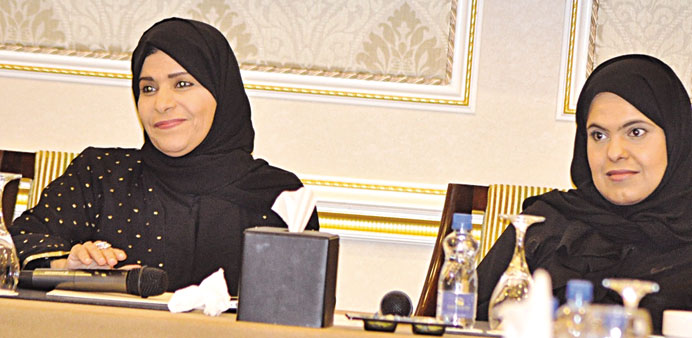Aisha bint Jassim al-Kuwari and Dr Haya al-Madadi.
Qatar Red Crescent (QRC) recently organised a women-only workshop under the title ‘Youth’s Role in Humanitarian Organisations’ in celebration of International Youth Day.
The event was attended by QRC volunteers and representatives of the QRC Ladies Forum and Ministry of Youth and Sports, among others.
The workshop discussed key topics such as the current role of youth in humanitarian organisations, suggestions and ideas for better youth participation in charitable action, personal and community barriers to volunteering and the role of institutions in this respect, ways to raise awareness of social responsibility among nationals and residents, and a women-oriented survey on volunteering and its areas and challenges.
On behalf of QRC secretary-general Saleh bin Ali al-Mohannadi, the session was opened by Najat al-Haidous, head of the QRC Volunteers Division, who delivered a keynote speech on the history of volunteering at the organisation.
Noura al-Dossari, chairwoman of the QRC Ladies Forum, spoke about the integration of state and private efforts to develop and help the youth actualise their own volunteering, charitable, and humanitarian initiatives.
Aisha bint Jassim al-Kuwari, chairwoman of Qatar Centre for Voluntary Activities, gave an overview of the centre’s activities and belief in the role played by the youth in achieving Qatar National Vision 2030.
The floor was then given to Dr Haya al-Madadi, the workshop’s moderator and representative of the ministry, who welcomed the guests and initiated discussions.
Kulthum al-Kaabi from the Tomouh Initiative described her volunteering experience and the projects undertaken by the group.
Nouf al-Merri from the Sanad Initiative talked about her history with volunteering and how it is important to start developing a sense of responsibility towards society and the nation from childhood.
Several challenges to volunteerism were highlighted, such as the lack of a distinct platform that publicises voluntary activities in Qatar, as well as inadequate education of parents about the importance of engaging children and young people in voluntary activities.
After that, Mounira Mohamed (a guest) emphasised the fact that voluntary projects and popular initiatives are poorly marketed, attributing this to insufficient training, low self-confidence and acceptability concerns among the leaders of those initiatives.
After the gathering, al-Kuwari said: “We in Qatar enjoy great advantages that have made it a country of the youth in its leadership, vision and attention to that segment, which stands as the pillar of the present and future of our nation. State institutions work not only for the youth, but also with them, in line with their ambitions and preferences. Qatar always pins her greatest hopes on its youth in all fields.”
Al-Kuwari revealed a new project to establish a Qatari volunteer database, with an up-to-date network covering the voluntary activities of all government and non-government organisations. The database will help the youth find any information they want online to make use of possible volunteering opportunities.
On her part, Dr al-Madadi commended the workshop and the interactive attendance, thanking the organisers for inviting her and for holding the event.
Presenting personal experiences gives life examples for volunteers and encourages the youth to be more socially active. The feedback from youth engagements in humanitarian events and projects was excellent, as in the nationally and internationally welcomed Disaster Management Camp, it was observed. There were constructive proposals to focus on the coming generation, by promoting community participation at schools and youth centres, inspiring the youth to take action, creating a big humanitarian goal for them to pursue and spreading social responsibility, particularly through parenting.
The workshop came up with some viable ideas for more effective youth engagement. The group discussed the slogan of the International Youth Day, “Say no to drugs, say no to smoking”, which addresses mental and psychological health.
They also discussed how the youth could gain self-acceptance through helping others and making them happy, whether in terms of the rewarding emotional effects of being helpful or in terms of the spiritual satisfaction resulting from benevolence as urged by the Islamic religion.

